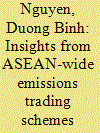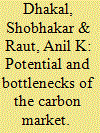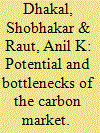|
|
|
Sort Order |
|
|
|
Items / Page
|
|
|
|
|
|
|
| Srl | Item |
| 1 |
ID:
191300


|
|
|
|
|
| Summary/Abstract |
ASEAN has not yet had any joint policy to constrain emission levels in the context of global efforts to tackle climate change and studies on such issues in the region are still scarce. This study employs a global computable general equilibrium (CGE) climate change policy-focused and electricity-detailed model to examine the impacts of emissions trading schemes (ETSs) on the ASEAN member economies. We found that Indonesia (a permit buyer) experiences much lower economic costs in the regional ETS scenarios rather than in its closed ETS market (−9% compared to −16% in real GDP). Malaysia, the Philippines, Singapore, Thailand and Vietnam act as permit sellers and experience higher economic costs in the regional ETS scenarios. It is because the balance on the current account, which is equal to the sum of the ordinary trade balance and net emissions trading revenue, is assumed to be fixed. Furthermore, the change in ratio of trade balance to regional income is also fixed. Such a setting indicates that if the net permit trading revenue is used to fully compensate for the trade balance, which is also maintained along with the changes in the regional income, permit selling countries will be worse off and vice versa if they move from their domestic ETS markets into a regional ETS market. Results also show that technological improvements can help reduce economic costs of the ETSs. In addition, renewable energy sources show strong expansions in their production levels, but they are still far from becoming dominant in ASEAN in order to significantly reduce economic costs of climate change policies. Households will also increase their demand for renewable energy in all ASEAN countries while lowering demand for fossil-based energy; however, this sector will still experience reductions in the overall electricity demand due to previous strong reliance on fossil-based energy.
|
|
|
|
|
|
|
|
|
|
|
|
|
|
|
|
| 2 |
ID:
096744


|
|
|
|
|
| Publication |
2010.
|
| Summary/Abstract |
The majority of clean development mechanism (CDM) projects are confined to a few countries. For many developing nations, entry into the carbon market, either through CDM or others, has been difficult. Thus, rationalizing CDM projects and the carbon market as a tool for sustainable development is often questioned. Many developing countries, such as Nepal, lack a quantification of CO2 reduction potential and an assessment of bottlenecks necessary for the carbon market. In this context, this paper assesses the potential emission reductions from major sectors of Nepal and the accompanying bottlenecks of the carbon market. The analyses provide indications of the type and scale of the carbon mitigation opportunities in key sectors such as waste management, biogas utilization, promotion of electric vehicles, rice cultivation, bio-energy utilization, brick making, hydropower development and a few others. These might be helpful to decision-makers in Nepal as well as to the process of re-orienting CDM and other carbon markets to better understand the bottlenecks of developing countries.
|
|
|
|
|
|
|
|
|
|
|
|
|
|
|
|
| 3 |
ID:
097599


|
|
|
|
|
| Publication |
2010.
|
| Summary/Abstract |
The majority of clean development mechanism (CDM) projects are confined to a few countries. For many developing nations, entry into the carbon market, either through CDM or others, has been difficult. Thus, rationalizing CDM projects and the carbon market as a tool for sustainable development is often questioned. Many developing countries, such as Nepal, lack a quantification of CO2 reduction potential and an assessment of bottlenecks necessary for the carbon market. In this context, this paper assesses the potential emission reductions from major sectors of Nepal and the accompanying bottlenecks of the carbon market. The analyses provide indications of the type and scale of the carbon mitigation opportunities in key sectors such as waste management, biogas utilization, promotion of electric vehicles, rice cultivation, bio-energy utilization, brick making, hydropower development and a few others. These might be helpful to decision-makers in Nepal as well as to the process of re-orienting CDM and other carbon markets to better understand the bottlenecks of developing countries.
|
|
|
|
|
|
|
|
|
|
|
|
|
|
|
|
| 4 |
ID:
167585


|
|
|
|
|
| Summary/Abstract |
Despite concerns on their effectiveness and legitimacy, carbon markets are often presented as the main tool of climate policy. Developing countries are particularly eager to establish and interlink their carbon markets to benefit from global climate investment flows. Turkey is a belated but willing player in this endeavor. In tracing the ambivalent politics of establishing a carbon market in Turkey, we focus on the perceptions of different actors vis-à-vis carbon marketization attempts. Using policy documents, 22 expert interviews, and process tracing, we question the underlying assumptions on carbon markets in a country with unambitious climate targets. Our findings suggest that the making of carbon market in Turkey is not necessarily a rational, national interest-driven process but instead one promoted by the international organizations including World Bank and the EU. We conclude that this preference for market-based instruments defer public interest, favor more incremental policies, and ignore distributive justice concerns.
|
|
|
|
|
|
|
|
|
|
|
|
|
|
|
|
| 5 |
ID:
138919


|
|
|
|
|
| Summary/Abstract |
In 2008, the European Union (EU) decided to include aviation in its Emissions Trading System (ETS) in order to realize emissions reductions in the aviation sector. However, the unilateral measure has triggered strong opposition from various actors, and now, the EU finds itself in the middle of a substantial power struggle about the creation of a global scheme for international aviation emissions reduction. China plays an important role as it has not only banned its airlines from complying with the EU ETS, but also implemented economic retaliatory measures, such as freezing orders of new European Airbus aircraft. Consequently, Beijing could successfully form coalitions with other countries to dilute international negotiations at the International Civil Aviation Organization (ICAO) assembly in 2013. The study reveals the hardships that the establishment of a global carbon emissions reduction scheme for aviation faces. It discusses the leading role of the EU on the issue, and provides a general assessment of possible responses to the aviation directive. It then analyzes China’s position on the inclusion of aviation under a global carbon reduction scheme. Finally, the study provides a prospect on how to overcome the diplomatic struggle in order to achieve concrete carbon emission reductions in aviation. As the study concludes, the EU and the rest of the world would be better off by refraining from unilateral mitigation measures and emphasizing more involvement, engagement, and capacity building in negotiating a possible carbon reduction scheme at the international level.
|
|
|
|
|
|
|
|
|
|
|
|
|
|
|
|
| 6 |
ID:
098930


|
|
|
|
|
|
|
|